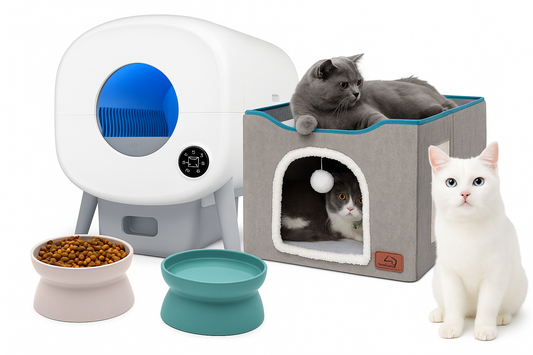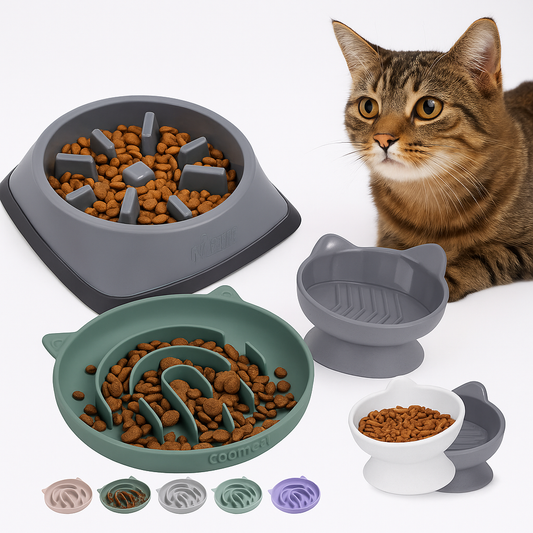
Is It Okay to Let My Cat Sleep in Bed With Me?
Should my cat sleep in my bed? If you’ve ever asked this while nudging your purring furball off your pillow for the umpteenth time — welcome to the club. Cats have a way of turning a king-size bed into a cramped corner for their humans, and somehow, we let them. Sharing your bed with a cat can be sweet, hilarious, heartwarming — and occasionally a total sleep-wrecking, sneeze-triggering disaster.
So, is it worth it? Should you gently push your cat off the bed and reclaim your blanket fortress, or surrender to the snuggles and let them rule the mattress? Like most things in the cat world, there’s no one-size-fits-all answer. Let’s break down the real-life pros and cons of sleeping with cats, unpack whether it’s truly safe to let your cat sleep with you, and help you figure out what works best for both your shut-eye and your cat’s comfort.
The Bed is the Throne — And You’re Its Warmest Cushion

First, understand this: your cat doesn’t just like your bed — they think it’s theirs. Many cats treat the bed as prime real estate. It’s warm, elevated, smells like their favorite human (you), and provides a soft launchpad for dramatic 3 AM zoomies.
Even cats who seem aloof during the day often become little shadows at night. Why? Because cats are crepuscular — they love dawn and dusk. You, cozy and half-asleep, are the perfect cuddle buddy and unsuspecting midnight snack machine.
The Sweet Side: Reasons to Say Yes to Bedtime Snuggles
1. Bonding on a Whole New Level
There’s something deeply comforting about having your cat curl up beside you. For your cat, sleeping close is a sign of trust — in the wild, cats only sleep near companions they feel safe with. So, if Fluffy sprawls belly-up next to you, congrats: you’re family.
For many people, this nightly closeness becomes a soothing ritual. After a stressful day, feeling that warm ball of fur pressed against your leg can slow your breathing and quiet racing thoughts. Some studies even suggest that petting a cat lowers cortisol, the stress hormone.
Check out What Your Cat’s Personality Says About You for a fun look at how your cat’s vibe matches your own.
2. Built-In Purr Therapy
One underrated perk of co-sleeping: the purr. Cat purrs vibrate at a frequency that promotes calmness — and there’s real research backing it. Many cat parents swear that the gentle hum of a purr works better than any white noise machine.
Some studies even hint that purring might help bone healing and reduce pain — though your cat probably isn’t actively trying to heal your sprained ankle at 2 AM. Still, purrs are nature’s lullaby, and who wouldn’t want that?
3. Warmth on Cold Nights

Cats run warm — around 102°F — so having a cat curled up near your feet is like hugging a tiny, living hot water bottle. In the depths of winter, this is a gift. Many people with older homes or drafty apartments swear they sleep warmer and cozier thanks to their feline bed buddies.
4. Routine and Security for Your Cat
Routine is everything for cats. When you allow your cat to share your bed, it can help them feel more secure, especially if they’re naturally anxious. Cats who sleep with their humans often have fewer nighttime freak-outs — assuming they’re healthy and well-exercised.
For rescued cats, sleeping in bed can also help them adjust to new homes. Feeling your scent and heartbeat provides reassurance, reducing stress behaviors like yowling or scratching at doors.
The Not-So-Cute Side: The Downsides You Should Know
Now, let’s be real. Letting your cat sleep in your bed isn’t all cuddles and rainbows. Before you commit, consider the trade-offs.
1. Your Sleep Might Suffer (Big Time)
This is the biggest issue for most people. Cats are notorious for nocturnal hijinks:
- Random attacks on your feet under the blanket.
- Sudden sprints across your body at 3 AM.
- Loud meowing for food just before dawn.
- The dreaded “paw to the face” wake-up call.
If you’re a light sleeper, expect broken sleep, strange dreams, and an alarm clock that ignores weekends and holidays. Cats naturally cycle through light and deep sleep — if you’re curious about their wild sleep habits and whether they dream (spoiler: they probably do!), check out Do Cats Dream? The Surprising Truth About Feline Sleep for more insight into what’s happening in that little furball’s head while you’re trying to snooze.
2. Allergies: The Unseen Foe
Even if you don’t have a full-blown cat allergy, low-level sensitivity can get worse when you’re face-to-face with fur all night. Common complaints include nasal congestion, itchy eyes, or waking up feeling stuffy.
If you or your partner has asthma, sharing a bed with a cat might not be worth the risk. It’s better to train your cat to love a separate bed nearby — everyone breathes easier that way.
3. Hygiene and Health Risks
Let’s get blunt: cats don’t always have the cleanest paws. They dig in litter boxes, prowl around dusty corners, and sometimes roll in questionable stuff if they have outdoor access. All of that can wind up on your sheets.
Also, while rare, there’s a slim chance of zoonotic diseases or parasites. A healthy, indoor cat on regular flea treatments is very low risk, but it’s still something to be aware of.
4. Relationship Tension
One surprising downside? Not everyone wants a cat wedged between them and their partner. Plenty of couples find themselves sleeping at odd angles, or waking up cramped, because the cat insists on sleeping horizontally across both pillows.
It sounds funny — until your back hurts and your spouse mutters “It’s me or the cat” at 3 AM.
Is It Safe to Let My Cat Sleep With Me?
In most cases: yes, it’s safe — assuming your cat is healthy, up to date on vaccinations, and free of fleas or parasites.
Exceptions:
- Infants or very young children: Babies should not co-sleep with pets due to suffocation risks.
- People with severe immune issues: Talk to your doctor if you’re immunocompromised — you may be advised to keep the bedroom pet-free.
- Aggressive cats: If your cat bites or scratches unexpectedly, they might need behavior training before they’re a safe bedmate.
How to Make Co-Sleeping Work (Without Losing Your Mind)
If you want the cuddles but not the chaos, here are some survival tips:
1. Tire Them Out First
A bored cat is a hyper cat. Schedule a solid 15–30 minute play session before bed. Wand toys, laser pointers, or a good chase game can drain that excess energy and make them more likely to snooze through the night.
2. Feed Them Late
Cats often wake you up because they’re hungry at dawn. Try feeding your cat their biggest meal right before bed. A full belly can keep them satisfied until your alarm clock goes off.
3. Create a Cozy Spot

If you don’t want them on your pillow, train them to sleep at your feet or on a dedicated blanket. Cats love routines — they’ll learn where they’re allowed if you’re consistent.
4. Use a Door If Needed
Sometimes, despite your best efforts, co-sleeping just doesn’t work. And that’s okay. If your sleep is suffering or your allergies are flaring up, it’s better for everyone to set some boundaries.
Start by moving your cat’s bed just outside your door, so they don’t feel abandoned. Offer treats and praise when they settle in their spot. Most cats adjust with a little patience.
Real Cat Parents Weigh In
Sharing your bed with a cat is a love-it-or-hate-it ritual for many. Here’s what real cat parents have shared about it, drawn from threads, pet owner surveys, and reputable sources:
Cat owner survey, AP News:
According to an AP-Petside poll, nearly half of pet owners say they share their bed with their pet. Many admit they sleep better with a cat curled next to them — until they don’t. One owner quipped, “My cat’s snore is oddly soothing, but I wake up with zero blanket left!” (Source)
Pet owners on Reddit’s r/cats community:
Some people love the closeness: “My cat insists on sleeping on my chest. It’s heavy but comforting — except when he decides to groom my hair at 2 AM.” Others point out the downside: “She kneads my stomach all night. Cute, but my sleep schedule is toast.” (See community stories here)
Insights from a SELF Magazine pet owner feature:
A cat parent told SELF that they ended up getting a separate heated cat bed because co-sleeping flared up their allergies. “I love him, but my breathing is more important. Now he snoozes right by my bed instead — best of both worlds.” (Source)
Final Verdict: Should My Cat Sleep in My Bed?
The answer depends on you and your cat’s personalities, your health, and your tolerance for middle-of-the-night surprises. For many, the comfort and closeness far outweigh the downsides. For others, a separate but nearby bed is the happy compromise.
Whatever you decide, don’t feel guilty. Your cat doesn’t need to sleep on your pillow to know you love them. With good playtime, a cozy setup, and consistent care, they’ll feel just as safe and adored — bed or no bed.
Have More Cat Questions?
Check out Capnip.co for more FAQs, tips, and real-world advice to keep you and your whiskered friend living your best lives — day and night.



